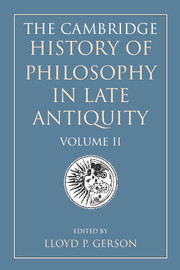Book contents
- Frontmatter
- VI Late Platonism
- VII The third encounter of Christianity with ancient Greek philosophy
- Introduction to Part VII
- 42 Pseudo-Dionysius the Areopagite
- 43 Boethius
- 44 Maximus the Confessor
- 45 John Scotus Eriugena
- VIII Philosophy in transition
- Appendix: List of works of ancient authors
- List of abbreviations
- Bibliography
- Index locorum
- General index
- References
44 - Maximus the Confessor
from VII - The third encounter of Christianity with ancient Greek philosophy
Published online by Cambridge University Press: 28 May 2011
- Frontmatter
- VI Late Platonism
- VII The third encounter of Christianity with ancient Greek philosophy
- Introduction to Part VII
- 42 Pseudo-Dionysius the Areopagite
- 43 Boethius
- 44 Maximus the Confessor
- 45 John Scotus Eriugena
- VIII Philosophy in transition
- Appendix: List of works of ancient authors
- List of abbreviations
- Bibliography
- Index locorum
- General index
- References
Summary
The work of Maximus the Confessor (580–662) presents the philosophical world view of the Greek-speaking Christian tradition in its most fully developed form. It is comprehensive both in the extent to which it draws upon earlier authors – including Clement of Alexandria, Origen, the Cappadocian Fathers, Nemesius of Emesa, Evagrius of Pontus, Cyril of Alexandria, and Pseudo-Dionysius, among others – and in its far-ranging scope. Pride of place among the influences on Maximus must undoubtedly go to Pseudo-Dionysius. Like the Areopagite, Maximus regards ‘good’ as the pre-eminent divine name, and he welcomes the Platonic description of the Good as ‘beyond being’ as appropriate to the Christian God. He is also like Pseudo-Dionysius in his vision of the cosmos as fundamentally theophanic, a manifestation of intelligible or spiritual reality in sensible form. However, Maximus is more explicit than Pseudo-Dionysius about the role of the divine will in creation, and he gives a more prominent role to the Incarnation as the central act by which the divine is made manifest. Accordingly, whereas Pseudo-Dionysius can be (and often has been) read as implicitly denying that God is a personal being, for Maximus the personal character of God is never in question.
Any attempt to situate Maximus within the history of philosophy must begin with some disclaimers. Maximus writes as a theologian rather than a philosopher, and many of his most interesting ideas are presented through elaborate allegorical interpretations of Scripture. To winnow out the philosophical elements, as we shall do here, can inevitably present only a partial picture of his thought.
- Type
- Chapter
- Information
- The Cambridge History of Philosophy in Late Antiquity , pp. 813 - 828Publisher: Cambridge University PressPrint publication year: 2000
References
- 1
- Cited by

